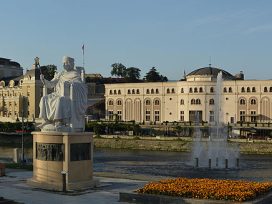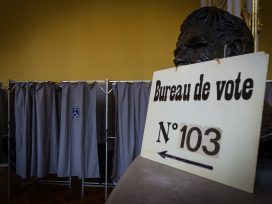‘Things are serious: the ‘great democratic revolution’ of modern times, as Tocqueville once called it, appears to be spluttering to a halt. Some observers, recalling the disasters of the 1920s and 30s, are suggesting that an anti-democratic counterrevolution on a global scale has begun.’
This is how John Keane begins his keynote article to a new Eurozine focal point gathering perspectives from eastern Europe, Central Asia and beyond, in countries and regions where the future of democracy hangs in the balance.
But is the writing really on the wall for democracy? Or does a declinist bias prevent us from recognizing moments of democratic renewal? What can ‘established democracies’ learn from those struggling for democratic standards outside the centre?
In this focal point, empirical and theoretical approaches combine to provide a snapshot of the state of democracy at a historical moment of war and instability.

In collaboration with

The local election victory of Zagreb je naš/Možemo in 2021 drew on experience of activism going back well over a decade. Campaigning positively on neglected socio-economic issues, the platform operates outside the identitarian parameters of conventional Croatian politics. But reproducing success at the national level will be a challenge.

Bulgaria will go to the polls on 2 April for the fifth time in two years, without there being any prospects of a resolution to the stalemate between liberal and pro-Russian forces. Caught in permanent election mode, the country is becoming increasingly isolated from Europe, while authoritarian influences gain ground.

People power?
A reply to James Miller
A reductionist definition of democracy as ‘people power’ fails to grasp democracy’s political evolution as guarantee against tyranny. Giving a voice to the biosphere extends this principle and is not to negate democracy’s own conditions.

North Macedonia’s choice to support Ukraine has exposed it to intensified hybrid attacks. But internal divisions and festering disputes with neighbouring Bulgaria create a fertile ground for Russian interference, feeding existing resentment and a sense of encirclement.

Voters have always overlooked breaches of democratic principle as long as they are getting what they want. This mattered less when politicians held each other in check. But with the tribalisation of public debate, democratic gatekeeping breaks down.

Bloodless democracy?
A response to John Keane
In his sweeping survey of ‘democides’, John Keane associates democracy with all that is deserving of respect, including nature itself. But ‘true democracy’, as Marx put it, is much less polite. Can we really invoke it to save the planet?

Sudden death stories of democracy do us a disservice. The truth is that democracy can be destroyed in multiple ways, at different tempos. The slowest of these – environmental degradation – is a consequence of the anthropocentric ideal underlying democracy itself.
Two decades of speculative building and misuse of earthquake funds set Turkey up for disaster. Erdoğan’s AKP failed to plan or react, but will do anything to hang on to power.
The current regime in Tbilisi – nominally led by Irakli Garibashvili but with oligarch Bidzina Ivanishvili pulling the strings – marks a sea change in Georgia’s gradual pro-western path of development over the past thirty years. For all the faults of past governments, there is no precedent for the authoritarian turn underway since 2020.
An escalation of violence brought Brazil to the verge of democratic collapse on 8 January, as Bolsonaristas stormed the centres of power, calling for a military coup. The worst was averted, but the country faces deep social divisions and a radicalized far-right, leaving President Lula no room for error.
Women’s rights activists protesting for a democratic Iran counteract armed police on the streets with non-hierarchical leadership, a rhizomatic network, transnationality and flash mobs. Their momentum, supported globally via the Iranian diaspora, also benefits from a legacy of historic feminist action under extreme oppression.
Surveillance state
At the roots of Greece’s spyware scandal
In the last decades, Greece has proven to be a resilient democracy that not even a devastating economic crisis could overturn. The current surveillance scandal and its political handling, however, raise the shadow of a traumatic past that no amount of file destruction could erase.







